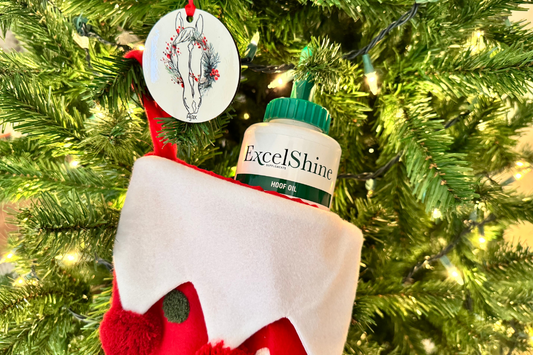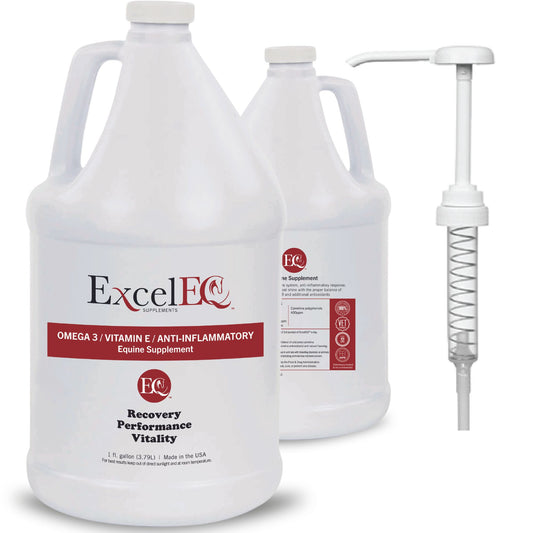Enhancing Equine Gastrointestinal Health with ExcelEQ ProElite: A Study on Oil Therapy
Share
Introduction to Equine Gastrointestinal Health
Understanding the gastrointestinal health of horses is crucial for both horse owners and managers. Horses, particularly those in training or competition, often face gastrointestinal issues such as gastric ulceration. While stomach ulcers are commonly identified through gastroscopy, hindgut conditions can be more challenging to diagnose. Recent research indicates that hindgut pathology may be as prevalent as stomach ulcers in horses.
Hindgut Ulceration: Background and Diagnosis
Hindgut ulcers in horses can be diagnosed through several methods, including:
- History and Clinical Signs: Observing symptoms and medical history.
- Blood Work: Changes in blood tests may indicate gastrointestinal issues.
- Abdominal Ultrasound: Imaging to assess internal conditions.
- Fecal Occult Blood Testing: Detects hidden blood in manure samples.
For a detailed overview of equine stomach ulcers, visit our blog post, Equine Stomach Ulcers.
Fecal Occult Blood Testing for Horses
The Succeed Equine Fecal Blood Test from Freedom Health LLC is a valuable tool that combines tests for fecal hemoglobin and albumin. Abnormal levels of these substances can indicate gastrointestinal issues, such as gastric or colonic ulceration.
Management Strategies for Hindgut Ulceration
Effective management of hindgut ulceration includes:
- Avoiding NSAIDs: Non-steroidal anti-inflammatory drugs can exacerbate ulcers.
- Frequent Low-Bulk Feedings: Helps reduce irritation and promotes healing.
- Reducing Inflammation: Essential for recovery.
- Managing Stress Levels: Stress can worsen gastrointestinal conditions.
Using Fatty Acids for Hindgut Ulceration
Omega-3 fatty acids are beneficial for gastrointestinal health due to their anti-inflammatory properties. They also reduce sugar and starch in the diet. ExcelEQ ProElite, a camelina oil-based product, offers excellent bioavailability of omega-3 fatty acids. Many horse owners use ExcelEQ ProElite to manage and prevent gastrointestinal issues.
Objective: Evaluating ExcelEQ ProElite's Impact on Gastrointestinal Health
This study aims to evaluate the effects of ExcelEQ ProElite on gastrointestinal health by comparing fecal occult blood test results before and after a 30-day supplementation period.
Study Design and Methodology
Participants: Six mature horses with a positive fecal blood test (Succeed Equine Fecal Blood Test) and no detectable parasites (negative fecal egg count) were selected. All horses exhibited at least one clinical sign of gastrointestinal ulceration before the study.
Methods:
- Initial Testing: Fecal occult blood test, baseline blood work (CBC and chemistry), and a clinical sign survey were conducted on Day 0.
- Supplementation: ExcelEQ ProElite was added to the feed at 4 ounces daily for 30 days (Day 1 to Day 30).
- Monitoring: Trainers/owners kept detailed logs of administration, acceptability, feeding, and training regimes.
- Final Testing: At the end of the 30-day trial, repeat fecal occult blood tests, blood work, and a clinical response survey were conducted.
Results: Positive Effects of ExcelEQ ProElite
All six horses consumed the 4 ounces of ExcelEQ ProElite mixed with their feed. Five horses received the oil in two doses of 2 ounces each, while one horse received the full 4 ounces in one feeding. After 30 days, five out of six horses showed significant improvement in fecal occult blood test results.
- Improvement Rate: 5 out of 6 horses transitioned from positive to negative fecal blood tests.
- Clinical Sign Improvement: All horses demonstrated improvement in clinical signs related to gastrointestinal distress.
Discussion: Insights from the Fecal Blood Test
The Succeed Equine Fecal Blood Test helps identify gastrointestinal bleeding by measuring fecal hemoglobin and albumin levels.
- Albumin: A protein that indicates bleeding injuries, often associated with the "leaky gut" syndrome in the hindgut.
- Hemoglobin: A marker of whole blood, which can originate from any part of the gastrointestinal tract.
The study found that horses with high fecal albumin levels showed notable improvement after ExcelEQ ProElite supplementation. Despite the limitations of fecal blood tests alone, the combination of positive test results and clinical observations strongly suggests a beneficial effect of ExcelEQ ProElite.
Conclusion: The Benefits of ExcelEQ ProElite for Gastrointestinal Health
The study concludes that ExcelEQ ProElite significantly improves gastrointestinal health in horses. Five out of six horses transitioned from positive to negative fecal blood tests, and all showed improved clinical signs. This supports the effectiveness of ExcelEQ ProElite in managing and preventing gastrointestinal upset in horses.
For more information on optimizing your horse's gastrointestinal health, explore our range of supplements and resources at Excel Supplements.






